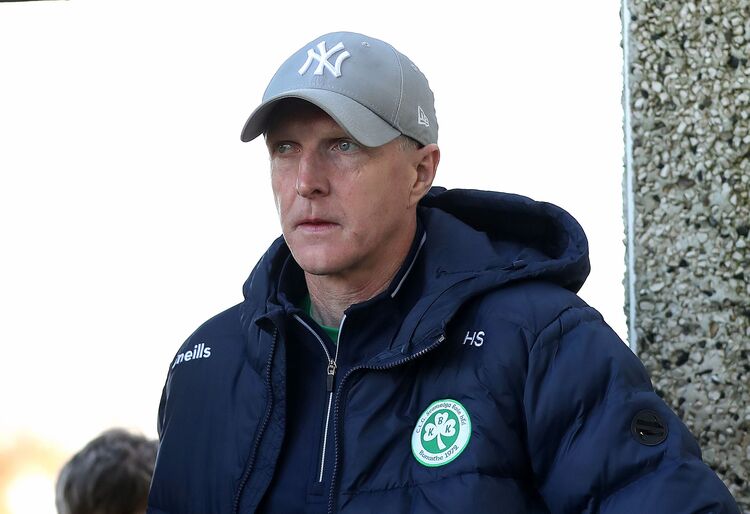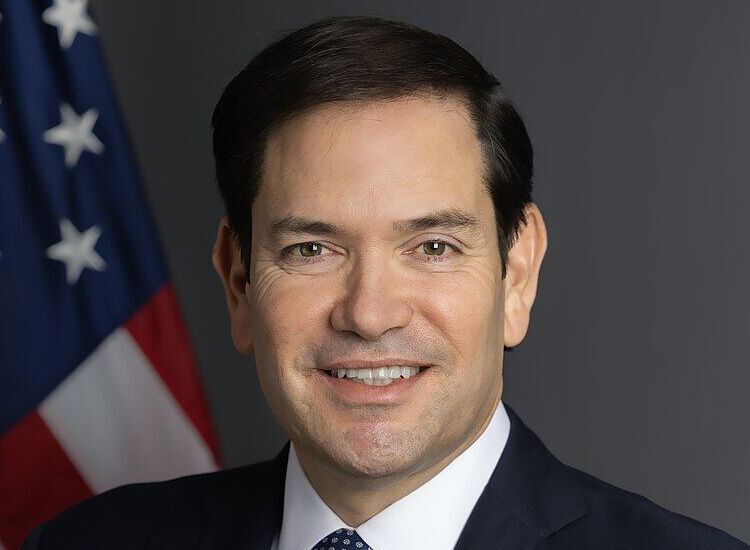[caption id="attachment_69401" align="aligncenter" width="600" caption="Treasa Goodwin Smyth at the mic."]
Many household names have featured in Treasa Goodwin Smyth’s radio show but one of them stands out. She met the famous Manchester United soccer player Roy Keane when she attended a press conference with tape-recorder in hand. “I just shouted up to him – ‘Roy,’ I said, ‘I’m from Cobh.’ ‘Come on up,’ he said. He was a very nice man to interview.”
The star who began his professional career with Cobh Ramblers gave Smyth what is now her favorite saying: “Irish by birth, Cork by the grace of God.” She laughed as she told the anecdote, her accent still strongly southern after years of living in America. An accomplished storyteller, she has a relaxed interview style, and that’s no surprise: Smyth has been involved with her radio show, “Ireland Calls,” for more than 20 years.
She has other irons in the fire too: 2012 will be the fifth year that she and her husband, past grand marshal and ESPN soccer commentator Tommy Smyth, co-host the St. Patrick’s Day parade in New York on Channel 4.
It’s not bad going for a farmer’s daughter whose initial career of choice was farm management. “I grew up on a farm, and I liked it,” she said. “It was hard work but there were 10 kids in my family. So we worked on the farm, a small farm in Cobh.” Smyth wanted to continue her studies but the family didn’t have money to send her to college. She did win a place at Gorteen Agricultural College, becoming the first woman from Cobh to study there. “That was the scholarship I was offered, and I took it,” she explains.
Ireland back then was a very different place. Things were just beginning to change, and some girls strayed beyond the traditional fields of cooking and secretarial work. At Gorteen, Smyth was one of 10 female and 80 male students. Sexism was not a problem, at least not right away, but after she graduated, the landscape looked different. One of her duties as a young farm accountant was to give advice to farmers. “I was very young of course, and they would say, ‘How would you know?’” she said. “It was tough. They were 60- or 70-year-old farmers. In their minds a woman’s place was in the kitchen.”
Unemployment was high in Ireland during the 1980s. When farming jobs came up, it soon became apparent to Smyth that they would automatically go to men. The turning point occurred when she went to an interview for a job as a farm manager. “The last thing the farmer said to me was, ‘You know how to run a farm. You’d run it very well, but I can’t give you the job.’ I asked him why, and he said, ‘Because you’re a woman.’”
Shortly after that, in 1984, Smyth left Ireland for the States. In New York she trained to be a nurse, while working as a nurse’s aide during the day and cleaning apartments. “I had 12 jobs going to college,” she said. And she had two children from her first marriage to raise. (Anthony, who is now 27, works on Wall Street, and 25-year-old Lisa is finishing college.) A kindly Italian babysitter helped out when she was out working or attending classes at school.
One elected representative in particular, Smyth believes, made her achievement possible. “Thank God, Mayor Koch was in, and he allowed people to go to college without being a citizen,” she recalled. “It was great. I went in as a foreign student, and it was wonderful.”
When her busy schedule allowed, Smyth would play sports. “For relaxation I would go play camogie with the kids. I’d go to the Young Ireland Camogie Club.” And that’s how she met Tommy Smyth.
“I was playing camogie in Gaelic Park,” she recalled.
She remembered that she’d wanted some information about Young Ireland Camogie club broadcast over the air. “I went up with all my friends [to the press box] and I handed him a note, and he pushed all my friends aside and said, ‘Who is this girl with the red hair?’ – I had red hair at that time.” He gave her his phone number and said if she ever wanted something announced again, he would do it. They became friends and it was only many years later that they got married.
Smyth had set up the “Ireland Calls” show in 1969 to bring news and showband music to emigrants when Irish newspapers were hard to come by, phone calls were expensive and flights even more so. He introduced Treasa Goodwin both to radio and the show. “He taught me all I know in broadcasting,” she said.
The internet has helped the show’s audience to spread – there are listeners now as far away as Kenya and Brazil. Its content – a mix of music, local events in the metropolitan area, interviews and sports – has had to take account of the changing demographics of the immigrant community in New York.
Smyth said many of the newcomers from Ireland are very well educated and have high expectations. “A lot of people coming to America would not do what I did when I came. Our generation accepted any job,” she said. “When you’re illegal, your job was to stay quiet, make some money, keep going and do what you can, and better yourself along the way.”
Even so she thinks that life is more challenging for the Irish now in some respects, especially for the undocumented. “In our day you could risk going home,” she said. “They’re fingerprinted now; they check everything on the computer. It’s very tight now. It’s harder for them.”
She’s been particularly happy to see one spin-off of that new flow of young immigrants: increased recruitment for Gaelic teams.
Smyth, for her part, hasn’t played any camogie games lately; but her approach to radio is much the same as it has been to sport. “I’m a Cork woman,” she said. “I played with my heart and that’s it.”
“Ireland Calls” radio show covers the tri-state area and can be heard every Saturday evening at 6 p.m. on 1460am; it is also streamed live on the web on wvox.com.








